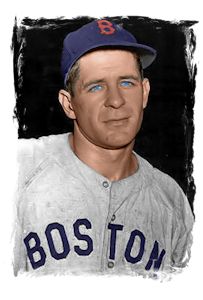 |
Johnny Lazor was born on September 9, 1912 in Taylor, Washington. He graduated from Tahoma High School and attended Washington State College for a year. Had baseball not worked out, he’d planned to become a forest ranger. Hunting, trapping, and fishing remained a source of enjoyment. He played baseball in high school and in the semipro and industrial leagues around the area. The Northwest League was the first semipro league in which he’d played. Next came the Seattle League where he was a catcher at first, but later became an outfielder. The manager of that team did some scouting for the Boston Red Sox and mentioned a baseball school the Red Sox were holding in San Diego in the spring of 1937. After they signed him, he went to Little Rock and trained there a while. He was then assigned to the Moultrie Chiefs of the Georgia-Florida League. In the 1937 season, his contract was transferred to Canton and he played both 1938 and 1939 in the Middle Atlantic League for the Canton Terriers. Promoted to the Scranton Red Sox in 1940, he proved he was ready for Class A baseball, and hit .306. Most of the 1941 season, was spent with Scranton again. In 1942 Johnny spent the full season with Louisville and had an even better year at the higher level. Anticipating their need in 1943, the Red Sox purchased his contract from Louisville in October. With Ted Williams in the Navy and with Dom DiMaggio and numerous other Red Sox starters also in the service, Johnny and several others had opportunities during the war years. He clearly merited a shot in any event, but it was definitely easier to stick given the depleted ranks. He trained with the club during their wartime spring-training home at Tufts College. Johnny played left field, in Williams’ stead, on Opening Day in Philadelphia. On May 20th he had his first multi-hit game, the second game of a doubleheader at Cleveland, when he was 3-for-4 with three RBIs. Two triples against the visiting Yankees helped produce another three RBIs in the second game of a September doubleheader. Those two games provided almost half of the 13 RBIs he produced in the 1943 campaign. He hit for a .226 average. In the spring of 1944 the team experimented with Johnny catching some games in spring training. Up to July he appeared in 12 games, with 14 at-bats, and hit only .143 without either a run scored or a run batted in. There was one game when he filled in as catcher on an emergency basis. He was optioned to the San Diego Padres at the end of July. Returning to the Red Sox in September, he finished out the season, appearing in four more games and getting 10 more at-bats. His final average was .083. It didn’t look as though there was room to break into the 1945 outfield and he was used in pinch roles for the first month. On May 31st, he went 2-for-4, going 2-for-4 the next day as well, and then hit his first major-league home run on June 2nd. He had a very good year in 1945, appearing in 101 games and driving in 45 runs while batting .310, the highest batting average on the team. That accomplishment put Johnny in good stead when returning servicemen came back after World War II in 1946. He wasn’t going to keep Ted Williams from reclaiming left field, but he was good enough to stick for the full season as a utility fielder. He appeared in 23 games but had only 29 at-bats. For the most part he was used late in games and when he did play, he was much less productive, hitting for a .138 average with only four runs batted in. He traveled to St. Louis and remained with the team during the 1946 World Series, but never played. The Red Sox sold his contract to the Portland Beavers in January 1947, and he spent the next three seasons, his last in baseball, in the Pacific Coast League. In the off-season, Johnny and his brother worked in the lumber camps but had very different type of jobs, they were in charge for providing the meat and fish that fed all the logging workers. They would hunt deer, elk, and birds and would provide fish for the cooks. After baseball he worked steam-cleaning oil tanks for the Anderson-Sherman company in Seattle. He also worked in a stone quarry near Renton, in a gravel pit running the crusher and the separator. Johnny Lazor passed away in Renton, Washington, on December 9, 2002 at age 90. |
|||||
